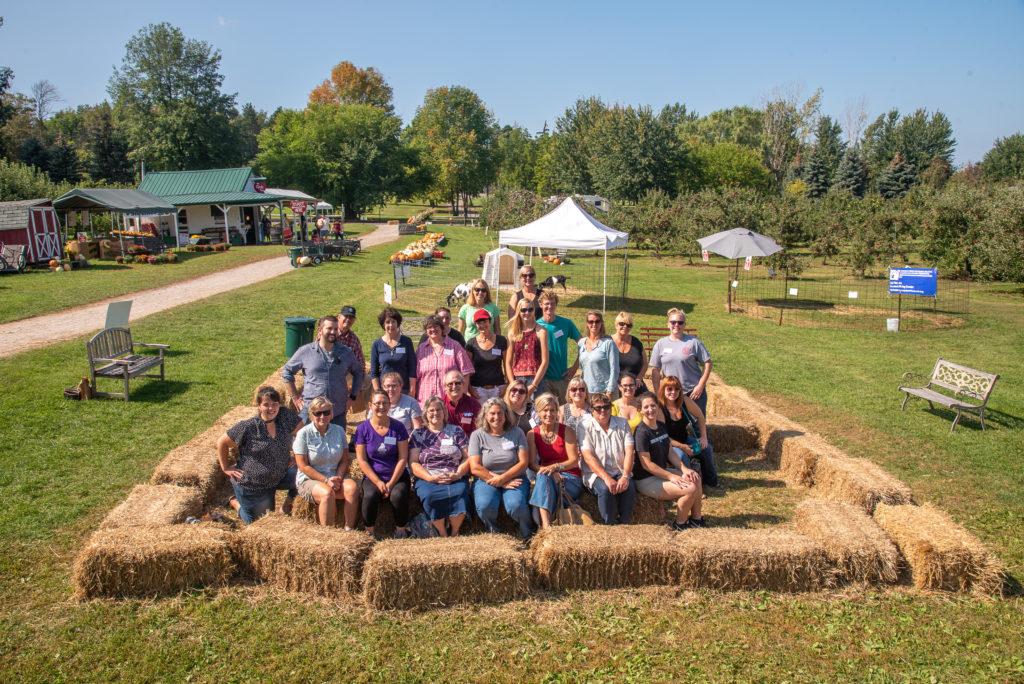Confidently Hosting a Farm Tour – What’s Your “Why Bother”?
Let’s face it. You probably didn’t go into farming to wear 25+ hats every day – ranging from accountant to mechanic, nutritionist to human resources manager, and electrician to professional “Google-er”. It’s likely that “Consumer Relations and Marketing Expert” didn’t even make it into your pile of hats. You might even be rolling your eyes a little thinking to yourself “great – this extension person wants me to add another thing to my to-do list”. Farm tours are something that more and more farms are beginning to add to their never ending to-do lists. While the effort on the farm’s part is not an easy lift, the benefits to the ag industry and to your neighborhood are incredible. So, while hosting farm tours aren’t required by any means, they might be something to think about in the back of your mind.
Why Bother?
Farm tours involve a lot of logistics and extra work on the farm end. While this series will address many of those concerns, it’s important to start with a conversation on why. Why do you want to host a farm tour? Why will it help your business/industry? Why bother? Your “why bother” will likely be different than mine, than your neighbor’s, than that guy that you follow on social media. And that’s okay! Knowing your “why bother” will help you to better plan your farm tour, define your audience, and keep you going when the morning of comes and you’re 10 steps behind.

Farm Tours are a great way for growers and producers to gather community members and stakeholders and provide an intimate look at their operation.
R.J. Anderson/Cornell Cooperative Extension
Neighbor Relations. This is the “why bother” that makes the most sense. Neighbors can be great supporters of the farm -but it takes time spent building that relationship and trust. An open invitation to visit the farm and go on a quick tour can be a great leap for both the farmer and the neighbor. A good neighbor that understands the farm business can be an advocate, a voice of support at the town hall meeting, or at least be a little more understanding when they hear the combine still going at 2 o’clock in the morning. As historically farm areas become more and more developed, our neighbors no longer have the common understanding of agriculture that used to ground our rural communities. This can create distrust based on misunderstanding, causing you headaches and angst. An invitation to the farm could be a great step towards building that mutual understanding.
Consumer Relations. The average consumer is 2.5 generations removed from the farm. As mentioned previously, we’re losing that common base of understanding how our food is produced. This creates distrust between the farmer and the consumer. However, 2.5 generations removed or not, we all need to eat – and we all need food grown by farmers. A farm tour can be a vehicle for consumers to better understand how their food is produced, and that it is coming from real-life people with families of their own. Something that might have seemed terrifying on a documentary they streamed, might be an everyday practice easily explained on a farm tour. Farm tours show a dedication to transparency, and an effort towards sharing our farming stories. Also, research has shown that one person will share their experiences with 22 others – good or bad. If you can provide one positive experience on a farm tour, that person will then share their positive vibes with 22 of their friends and family members. This type of genuine “recommendation” from a trusted member in friend circles can go a lot farther than a scary documentary or social media post.
Diversified Income. There are farms that are out there utilizing farm tours as a source of income. Is it easy to do that? Definitely not. BUT if you enjoy hosting farm tours and live in an area with enough of an agritourism interest to support that part of your operation, farms tours can provide an alternative stream of revenue for the farm business, as well as new customers for products you might sell directly to consumers. Throw in a petting zoo, a food truck, and maybe even some farm branded apparel and you’re a destination.
Education. Farm tours that incorporate school groups are often requested as part of a teacher’s curriculum. A visit to the farm provides an opportunity to tie in concepts learned through math, science, technology, and life-skills units. It’s unfortunate that agricultural curriculum is near non-existent in many schools, but a farm tour can provide a glimpse into an industry that offers many career opportunities (as well as feeds the world).
Good Excuse to Clean. And here we have the unexpected “why bother”. Rarely does someone go through the farm tour process to help clean up the farm, but is a great feeling to drive by and see those back corners weed wacked, the broken equipment moved into the pole barn, and the bale plastic safely disposed. While we all strive to have a picture perfect farmstead 365 days a year, a farm tour can help give a deadline and a goal to make it actually happen – at least for a few days.

